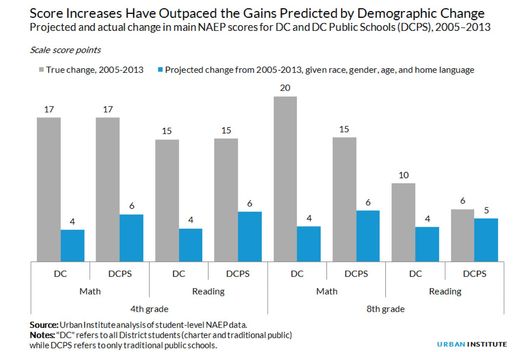Teacher Unions Still Haven’t Forgiven Michelle Rhee, Don’t Care How Well Her Policies Work

For teacher unions and their supporters, Rhee remains the premier antagonist, where her name remains a curse word. Erik Loomis laments that the Obama administration still “believes in Rheeism.”Casey Quinlan, writing for ThinkProgress, castigates the Obama administration for citing D.C. reforms as a model. Bruce Vailhas a whole article for In These Times lamenting the fact that Rhee’s successor, Kaya Henderson, has continued her policies (quotes from union sources: “[Rhee] is still here, but in the form of Kaya Henderson”; “It’s Rheeism without Rhee,” etc.)
But here is an odd thing that none of these sources mention: Rhee’s policies have worked. Studies have found that Rhee’s teacher-evaluation system has indeed increased student learning. What’s more, the overall performance of D.C. public school students on the National Assessment of Education Progress (NAEP) has risen dramatically and outpaced the rest of the country. And if you suspect cheating or “teaching to the test” is the cause, bear in mind NAEP tests are not the ones used in teacher evaluations; it’s a test used to assess national trends, with no incentive to cheat. (My wife works for a D.C. charter school.)
Some critics have suggested that perhaps the changing demographics in Washington (which has grown whiter and more affluent) account for the improvement. Kristin Blagg and Matthew Chingos at the Urban Institute dig into the data, and the answer is: Nope, that’s not it. The amount of improvement that would be expected by demographic change alone (the blue bars) is exceeded by the actual improvement (the gray bars):

This is important because Hillary Clinton is facing intense pressure to back away from the Obama administration’s pro-reform agenda. That pressure is coming from sources that regard the actual outcome of education policy for students to be a trivial question unworthy of consideration — both ThinkProgress and In These Times treat the position of teacher unions as ipso facto correct, and education policy solely as a question of labor rights for employees rather than as a vital component of an economic-mobility strategy. They don't claim Rhee's policies failed to improve student outcomes. They simply ignore the question. Loomis does assert, “alleviating poverty is far and away the most important piece of the solution to school inequality,” — a common aphorism among left-wing critics, which conveniently allows him to avoid mentioning the actual, Teachers Still Haven’t Forgiven Michelle Rhee -- NYMag:
